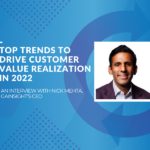Mastering Digital Customer Success: Insights From Valuize Spark Toronto
What does your Digital CS model look like today and what was the journey like to get here?
That was the question that sparked a thought-provoking 90-minute conversation at our very first Valuize Spark event in Toronto.
In the rapidly evolving B2B recurring revenue economy, the focus on Digital Customer Success is more pertinent than ever. To tackle this Herculean topic and unearth strategic insights, we turned to; Greg Elliott, SVP, Customer Experience at Loopio, Karen Eisen, SVP, Customer Success & Support at Alida, and Leah Clark, Advisor-in-Residence at Valuize.
Greg, Karen and Leah generously shared their learnings, challenges and triumphs in building, scaling and maturing their Digital CS programs. While they touched on data strategy, tooling and metrics, all 3 experts emphasized that successful Digital Customer Success programs demand a holistic approach, embracing cross-functional collaboration and strategic adaptation.
In a world where organizational scalability, profitability and efficiencies are paramount, the below insights and key takeaways from our panel shed light on why Digital CS is a linchpin for sustainable growth and how to achieve digital-led Net Dollar Retention in your organization.
1. Effective Cross-Functional Collaboration
Your Digital CS program should be directed by Customer Success but also requires close partnership with Marketing, Product, Sales, and Revenue Operations. A few key collaborative efforts include:
- Working with the Product team to improve self-enablement features in the platform, utilizing insights from digital programs for an iterative feedback loop.
- Continuously refining customer cohort experiments and performance through insights about your target market, Ideal Customer Profile (ICP), and personas, in a feedback loop with Marketing.
- Collaborating with Sales to tailor and improve customer engagement strategies, ensuring alignment between sales efforts and customer success objectives.
- Working with Revenue Operations to analyze and optimize customer journey touchpoints and conversion metrics, facilitating better alignment of digital CS strategies with revenue goals
2. Strategic Resourcing
Relying on traditional CSMs for fractional management of your digital program is not sustainable. Successful digital programming demands investment in specialized digital CS roles. As the program matures, consider recruiting experts in data science, customer experimentation, and programmatic approaches. These roles should be complemented by professionals skilled in data engineering and systems infrastructure.
3. Metrics for Evaluation
As your digital CS program grows and accumulates more insight, focus on metrics that clearly show the positive business impact. This includes the effects of digital lifecycle, touchpoints and engagement on key factors like renewal, retention, expansion, churn, upsell propensity, capacity improvements and margin. For executive buy-in and ongoing investment, align the outcomes of your digital CS program with the company’s overarching financial goals.
4. Organizational Impact
A Digital Customer Success program benefits not only individual customers but also your entire organization in terms of scalability, profitability, margins and efficiencies. Reframing the conversation internally to focus on scaling the organization enhances the program’s value from top down.
5. Iterative Program Development
First, achieve repeatability in your processes. With repeatability established, integrate automation to reduce reliance on CSM intervention. Next, apply these efficiency gains to upscale markets and develop predictive recommendations. Finally, extend these efficiencies across the go-to-market strategy, optimizing the deployment of CSM resources and guiding their actions effectively.
6. Enhancement with Specialized Tools
Your customer data collection & analysis needs to evolve from manual, unstructured collection to more advanced data science capabilities that can then be enhanced with AI. To ensure this progression, you need the right tools. Some of the fan favorites coming out of the panel were Gainsight, Pendo, Zendesk, SkillJar, and Gong.
7. Data Strategy
Start where you have the best data with the highest quality and the most reliability. As you grow, ensure cross-functional alignment so you can leverage valuable data housed in other parts of your organization (like Marketing or Product) for your Digital CS program.
8. Compelling Narrative for Buy-in
To gain executive support, craft a compelling narrative that emphasizes the ongoing value of your digital program. You need a diverse set of champions to take this program to market. Understanding how Digital can positively impact every part of the organization will help you secure executive buy-in.
To help define where your organization stands on the Digital CS maturity curve, articulate a clear roadmap for growth and garner executive buy-in, download The Digital Customer Success Maturity Model.





